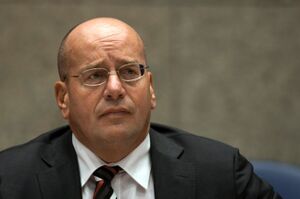Fred Teeven
(Politician, Deep state operative) | |
|---|---|
 | |
| Born | 5 August 1958 Haarlem, Netherlands |
| Nationality | Dutch |
| Alma mater | VU University Amsterdam, University of Twente |
| Interests | Illegal drug trade |
| Party | People's Party for Freedom and Democracy, Liveable Netherlands |
Prosecutor in Amsterdam "battling" drug trade in the 2000s. Replaced Pim Foruyn as placeholder. Former state secretary of justice during the 2010s. Resigned after lying to parliament about the paper-trail of deals made with criminals after Mark Rutte denied the paper-trail to even exist.
| |
Fredrik (Fred) Teeven is a former Dutch politician. As public prosecutor handling the new drug kingpins following Klaas Bruinsma's death, Teeven made some questionable deals with criminals in the 1990s and 2000s, leading to his resignation in 2015.[1]
Career
Teeven was born in the province of North Holland. He studied law at the VU University Amsterdam and public management at the University of Twente. Working first as a tax collector he became a prosecutor, becoming known as a crime fighter, since he led many investigations into organised crime. Teeven was involved in the prosecutions of Dési Bouterse, Mink Kok, Johan Verhoek, and Willem Holleeder.
Fortuyn
Teeven replaced Pim Fortuyn after he was forced to resign following his Islam statements. Fortuyn - set to win the general election - was shot dead 1 year later.
Teevendeal
On 10 March 2015 Justice Minister Ivo Opstelten resigned together with Teeven after the former had informed the House of Representatives wrongly in the early 2000s on a deal made by Teeven as state prosecutor in 1994. The deal concerned money paid to a drug trafficker whose money had been seized and received compensation after the origin of the money could not be proved to be illegal. Opstelten had mentioned to the House of Representatives a lower amount than the one that was actually paid, and that the receipt of the transaction had gone missing, while it later surfaced. In the wake of this scandal, House Chairwoman Anouchka van Miltenburg (who was a member of the same political party) resigned on 12 December 2015 when it became clear she had suppressed two letters of a whistle blower from the justice department who had already mentioned the right details on the 'deal', by putting the letters through the shredder. After resigning as State Secretary Teeven served as member of the House of Representatives between 26 March 2015 and 23 March 2017.[2]
Related Quotation
| Page | Quote | Author | Date |
|---|---|---|---|
| Maarten van Traa | “As just stated, back in the early 1990s Langendoen and Van Vondel played a key role in the IRT affair. However, the more one tries to understand the affair, the vaguer it gets. Langendoen and Van Vondel allowed drug shipments to pass through customs in order to be able to find and arrest the major mafia bosses behind the trafficking, a typical American strategy that before and since the IRT affair has largely been illegal in the Netherlands. A June 1999 article explains the affair in the following manner: "Criminals didn't import 100 kilos [of cocaine] with help from the Dutch police, as the 1996 Van Traa Commission concluded, but 15,000 kilos of cocaine has been brought to market. But for the rest everything is a-okay.
"Various justice officers, an independent Wierenga Commission (1994), the parliamentary enquete [Van Traa] commission (1995) and the rijksrecherche [FBI] (1996) never managed to fully clarify the IRT affair. What is certain is that under the leadership of two Haarlem detectives, Langendoen and Van Vondel, who worked for the IRT team, about 100,000 kilos of soft drugs was brought onto the market during infiltration attempts [i.e., authorized pass-throughs]. But many questions remained unanswered. It is unclear, for example, how the police financed the drug imports and there was evidence that cocaine was imported royally. "Teeven and his chief officer H. Vrakking - who in 1993 decided to dissolve the IRT team... - have always been anxious to demonstrate that especially the Haarlem branch of the IRT team [i.e., Langendoen and Van Vondel] was out of line. ... Teeven recently opened negotiations with the for arms trafficking sentenced Mink K., who earlier had been a target of the IRT." The primary target of the IRT team was mafia boss Klaas Bruinsma. After he was murdered in 1991 his successors as John Engelsma, porn boss Charles Geerts, and especially Etienne Urka became the target of the IRT. No one was caught, however, and reportedly the IRT was so "fixated" on the Bruinsma/Urka network that they forgot to pay attention to the network of Mink Kok, who, together with his allies, managed to smuggle 15 tons of cocaine through the backdoor. Certainly Kok's partner, Jan Femer, referred to the IRT years of 1991-1993 as the "golden years": "We could bring in almost anything: hash, coke, heroin, semtex, whatever we wanted." Kok was arrested in August 1994 in relation to an assassination a year earlier.” | Maarten van Traa Joël van der Reijden | 2017 |